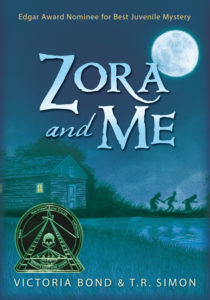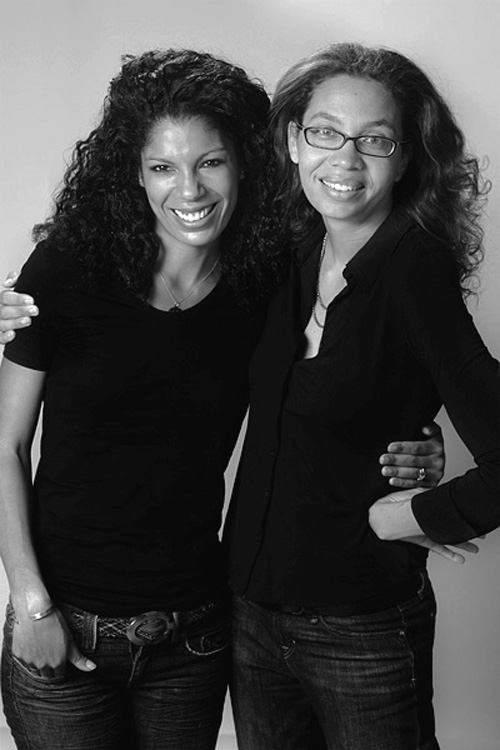 This middle school chapter book features Zora Neale Hurston and her best friend as 4th graders. Set in Hurston’s hometown of Eatonville, Fla., the novel paints a picture of life in this all-black township, incorporated soon after emancipation. The story shows how love, cultural affirmation, and resiliency permeate the children’s lives, even as the horrors of racism in the world beyond penetrate the warm embrace of the community. The linguistic beauty and the book’s historical and analytical depth honor the quality of Zora Neale Hurston’s work.
This middle school chapter book features Zora Neale Hurston and her best friend as 4th graders. Set in Hurston’s hometown of Eatonville, Fla., the novel paints a picture of life in this all-black township, incorporated soon after emancipation. The story shows how love, cultural affirmation, and resiliency permeate the children’s lives, even as the horrors of racism in the world beyond penetrate the warm embrace of the community. The linguistic beauty and the book’s historical and analytical depth honor the quality of Zora Neale Hurston’s work.
This is the only book not written by Hurston herself that is endorsed by the Zora Neale Hurston Trust. The book offers vivid language and numerous passages that can serve as writing prompts or examples for students. It is an easy-to-read yet sophisticated chapter book for middle and high school students.

“Zora and Me” authors Victoria Bond & T.R. Simon.
It is with sheer genius that Bond and Simon have created something for readers young and old — there are familiar references, like the ‘Brazzles,’ for true Zora-philes, as well as revelatory and wondrous information for those readers as yet uninitiated in the masterful storytelling of Zora Neale Hurston. This is a grand and accessible work that educates, informs, and entertains, and one that I am personally grateful was written for all of us. —Lucy Anne Hurston, niece of Zora Neale Hurston
Winner of the 2011 John Steptoe New Talent (Author) Award: “Racial duplicity threatens an idyllic African American community in the turn-of-the-century South in a dazzling debut inspired by the early life of Zora Neale Hurston.”
ISBN: 9780763658144 | Candlewick Press
Chapter one of the book is offered as a preview in PDF. Read here.
Excerpt
It’s funny how you can be in a story but not realize until the end that you were in one. Zora and I entered our story one Saturday two weeks before the start of fourth grade.
That Saturday, while our mamas were shopping, Zora and I were sitting under the big sweet gum tree across the road from Joe Clarke’s storefront making sure we were in earshot of the chorus of men that perched on his porch. We sat under the tree, digging our feet into the rich dark soil, inviting worms to tickle us between the toes. We pretended to be talking and playing with the spiky monkey balls that had fallen from the sweet gum branches, but we were really listening to the menfolk’s stories and salty comments and filing them away to talk about later on. That’s when Sonny Wrapped strolled up in his Sunday suit, strutting like he owned the town and not just a pair of new pointy shoes, and calling for folks to come watch him whup a gator.
Sonny was a young welder from Sanford who had come to Eatonville to court Maisie Allard. For three weekends straight, he’d been wooing her with sweet talk and wildflowers. When he wasn’t with her, he was shooting his mouth off about how tough he was. That particular day, Sonny had managed to track down the king of the gators, the biggest and oldest one in Lake Maitland, Sanford, or Eatonville. The gator’s name was Ghost, and for good reason. One minute he was sunning on a mud bank or floating in the pond, his back exposed like a twenty-foot-long banquet of rocks; the next minute he’d have disappeared, and the pond would be as still as a wall.
Anyway, Sonny got a couple dozen men to walk the short distance to Lake Hungerfort to watch him wrestle the gator. Zora’s father, her eldest brother, Bob, and Joe Clarke were among them. Nobody was thinking about the two of us, but we still had sense enough to lag behind and make ourselves invisible. Everyone stood a good ways back from the lake — close enough to see but far enough to have time to scoot up a tree if Sonny lost control.
Ghost lay still as death, but as Sonny approached, his eyes were like two slow-moving marbles. Before Sonny could jump Ghost from behind, the old gator swung his tail around and knocked Sonny off his feet.
To this day, I can still see Joe Clarke running toward Sonny, yelling, “Roll! Roll!” If Sonny could tumble out of the reach of Ghost’s jaws, he might have a chance.
But Sonny was too stunned to get his mind around Ghost’s cunning. He gaped, wide-eyed and mute, as the gator clamped down on his arm and dragged him into the water.
People began to scream. I think I remember screaming myself. One thing I remember for sure is Zora, just standing and watching without a sound, tears streaming down her face.
Joe Clarke is a big man, but he hesitated for a second — a grown man paying respect to his fear — before diving into the water. Two other brave men — Mr. Hurston and Bertram Edges, the blacksmith — dove in a moment later.
It took the three of them to drag Sonny back on dry ground. I’ll never know how. They were bruised like prizefighters. But they were better off than Sonny, whose arm had been mangled past all recognition.
Back in our homes, we chewed on silence and thought about Dr. Pritchard, awake all night trying to patch up Sonny and make him right.
The next morning, Joe Clarke rode to all the churches in his capacity as town marshal and gave the pastors the news: Sonny didn’t make it.
For two weeks after that, you would see pairs of grim men with shotguns scouring the ponds for a sign of Ghost, but they found nothing.
In the days that followed, Zora’s father said it “wasn’t fitting” to talk about what had happened to Sonny in front of women and children. Even Joe Clarke, who loved a story better than almost anyone, refused to talk about Sonny and Ghost.
Sometimes when I think back on that steamy afternoon, I can see my own father emerging soaking wet from Lake Hungerfort, Sonny’s broken body in his arms. But that was impossible, because my daddy had already been gone six months by then. And that’s another reason I remember that summer so clear: it was the summer my mama gave up believing my daddy would come home. She had cried just about all a person can cry.
As for Zora, while every kid in the schoolyard could talk of nothing else for days and pestered Zora and me for eyewitness reports, she quietly closed in on Sonny’s death, like an oyster on a bit of sand. A week later, she had finally turned that bit of sand into a storied pearl.







Twitter
Google plus
LinkedIn